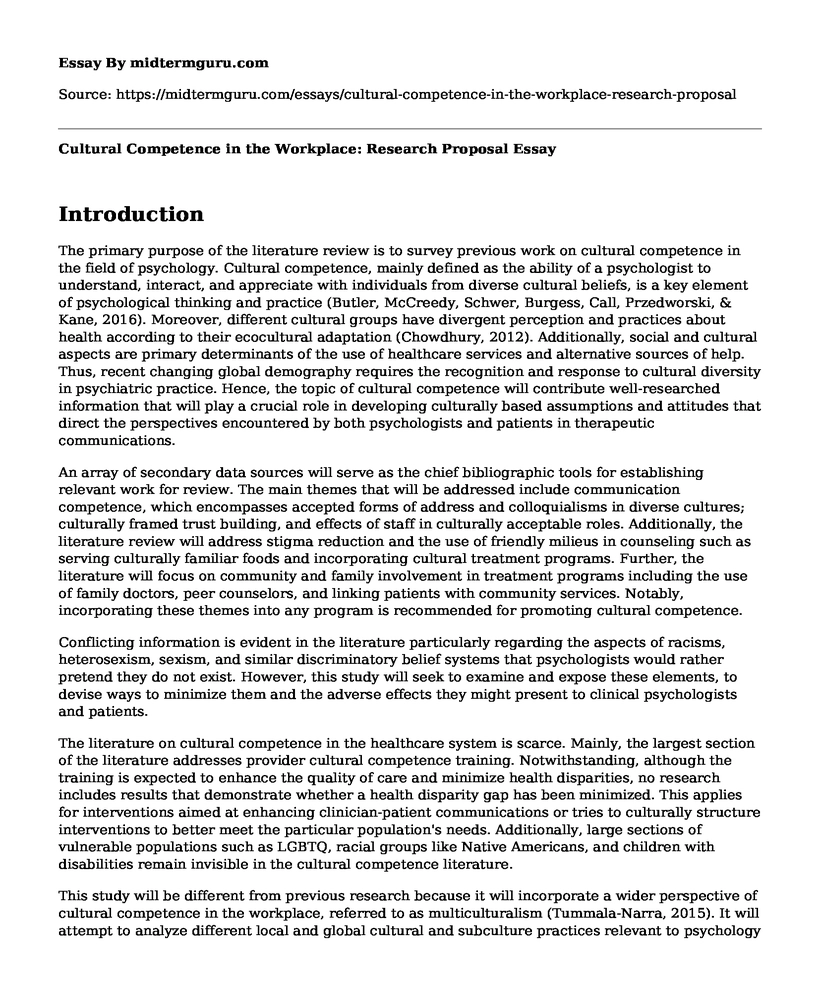Introduction
The primary purpose of the literature review is to survey previous work on cultural competence in the field of psychology. Cultural competence, mainly defined as the ability of a psychologist to understand, interact, and appreciate with individuals from diverse cultural beliefs, is a key element of psychological thinking and practice (Butler, McCreedy, Schwer, Burgess, Call, Przedworski, & Kane, 2016). Moreover, different cultural groups have divergent perception and practices about health according to their ecocultural adaptation (Chowdhury, 2012). Additionally, social and cultural aspects are primary determinants of the use of healthcare services and alternative sources of help. Thus, recent changing global demography requires the recognition and response to cultural diversity in psychiatric practice. Hence, the topic of cultural competence will contribute well-researched information that will play a crucial role in developing culturally based assumptions and attitudes that direct the perspectives encountered by both psychologists and patients in therapeutic communications.
An array of secondary data sources will serve as the chief bibliographic tools for establishing relevant work for review. The main themes that will be addressed include communication competence, which encompasses accepted forms of address and colloquialisms in diverse cultures; culturally framed trust building, and effects of staff in culturally acceptable roles. Additionally, the literature review will address stigma reduction and the use of friendly milieus in counseling such as serving culturally familiar foods and incorporating cultural treatment programs. Further, the literature will focus on community and family involvement in treatment programs including the use of family doctors, peer counselors, and linking patients with community services. Notably, incorporating these themes into any program is recommended for promoting cultural competence.
Conflicting information is evident in the literature particularly regarding the aspects of racisms, heterosexism, sexism, and similar discriminatory belief systems that psychologists would rather pretend they do not exist. However, this study will seek to examine and expose these elements, to devise ways to minimize them and the adverse effects they might present to clinical psychologists and patients.
The literature on cultural competence in the healthcare system is scarce. Mainly, the largest section of the literature addresses provider cultural competence training. Notwithstanding, although the training is expected to enhance the quality of care and minimize health disparities, no research includes results that demonstrate whether a health disparity gap has been minimized. This applies for interventions aimed at enhancing clinician-patient communications or tries to culturally structure interventions to better meet the particular population's needs. Additionally, large sections of vulnerable populations such as LGBTQ, racial groups like Native Americans, and children with disabilities remain invisible in the cultural competence literature.
This study will be different from previous research because it will incorporate a wider perspective of cultural competence in the workplace, referred to as multiculturalism (Tummala-Narra, 2015). It will attempt to analyze different local and global cultural and subculture practices relevant to psychology and their effectiveness. In particular, it will explain minority and majority group identities as rooted in the context of specific social interactions. Further, it will develop suitable culturally competent strategies for assessment, psychological interventions, and healing interventions consistent with the values and life experiences of a patient that psychologists can use to improve the patient's life. These strategies will be based on the information obtained from the various cultural practices and beliefs.
Conclusion
By focusing on the effectiveness of various culturally competent health care interventions particularly among minority groups, this study will add scholarly value to clinical psychology. Additionally, developing and incorporating strategies for assessment and treatment consistent with diverse cultural practices will provide sufficient information that professional psychologists and health facilities can use to create culturally competent workplaces.
References
Butler, M., McCreedy, E., Schwer, N., Burgess, D., Call, K., Przedworski, J., ... & Kane, R. L. (2016). Improving cultural competence to reduce health disparities.
Chowdhury, A. N. (2012). Culture, psychiatry and cultural competence. In Mental Illnesses-Understanding, Prediction and Control. InTech.
Tummala-Narra, P. (2015). Cultural competence as a core emphasis of psychoanalytic psychotherapy. Psychoanalytic Psychology, 32(2), 275.
Cite this page
Cultural Competence in the Workplace: Research Proposal. (2022, Sep 25). Retrieved from https://midtermguru.com/essays/cultural-competence-in-the-workplace-research-proposal
If you are the original author of this essay and no longer wish to have it published on the midtermguru.com website, please click below to request its removal:
- Background Screening: HR Article Review
- Learning on the Job is Ineffective - Essay Sample
- Paper Example on Racial Discrimination in the Workplace
- Essay Sample on Summer Internship at the Rehabilitation Center
- Paper Example on Ethical Principles in Downsizing Departmental Workforce
- Essay Sample on Cultural Diversity in Classrooms
- Work Environment Politics: Negotiating Power & Social Networking - Essay Sample







